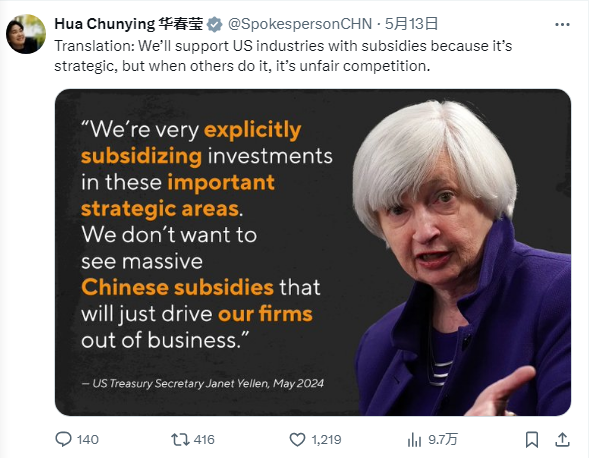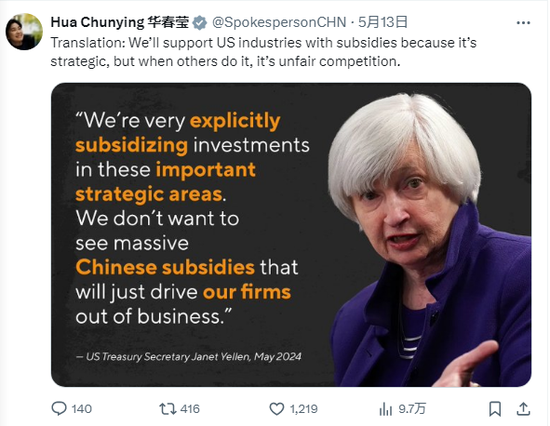Assistant Chinese foreign minister calls out double standards in U.S. 'overcapacity' narrative
(ECNS) -- China's Assistant Foreign Minister Hua Chunying posted on X this Monday, noting that the U.S. employs double standards regardingthe topic of "overcapacity."
The U.S. government "supports U.S. industries with subsidies because it’s strategic, but when others do it, it’s unfair competition," Hua said on X.
Her statement followed recent remarks by U.S. Treasury Secretary Janet Yellen, who hyped the "overcapacity" narrative targeting Chinese green energy sectors during an interview with Marketplace.

Is China "subsidizing more than we (the U.S.) are with our investments in the CHIPS Act and the infrastructure and all that?" asked the host of Marketplace, "Because the U.S. government is pouring billions in."
Yellen admitted that the U.S. government is "very explicitly subsidizing investments in these important strategic areas. And what we don’t want to see is massive Chinese subsidies to firms with huge overcapacity that will just drive our firms out of business."
We have targeted a few industries, particularly clean energy, electric vehicles, batteries, renewables, where we’re not trying to dominate the globe and be the only country in the world that supplies these goods, Yellen said. But we do think it’s critical for national security, for the sake of supply chain resilience, and to create good manufacturing jobs where people can get ahead to have a presence in these industries, she added.
The “China overcapacity” accusation may look like an economic discussion, but the truth is, that it is built on false logic and ignores more than 200 years of the basic concept of comparative advantage in Western economics, said Lin Jian, Chinese Foreign Ministry spokesperson at a regular press conference on April 30.
The U.S. knows full well that this “overcapacity” allegation goes against economic common sense and industry facts, yet still labels China with it, Lin said.
He further noted that the U.S. claim of “China overcapacity” is not a market-driven conclusion, but a crafted narrative to manipulate perception and politicize trade.
The real purpose is to hold back China’s high-quality development and deprive the country of its legitimate right to development, he said.
There isn’t a “China overcapacity”, but a US overcapacity of anxiety stemming from lack of confidence and smears against China, he concluded.

